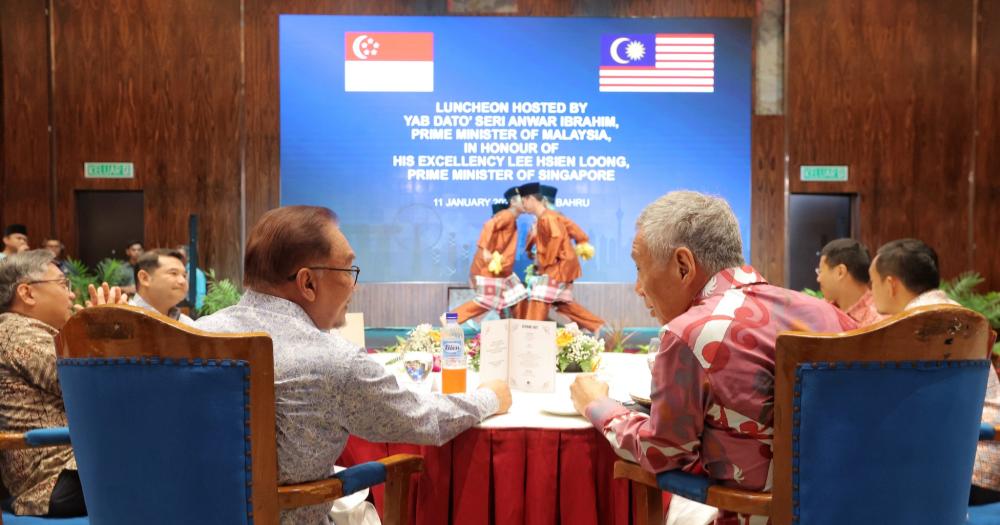Malaysian and Singaporean leaders met in Johor Bahru to sign a memorandum of understanding (MOU) to work on a Johor Singapore special economic zone (JS-SEZ).
The MOU was signed by Singapore’s Minister for Trade and Industry Gan Kim Yong, as well as Malaysia's Minister of Economy Mohd Rafizi Ramli.
The signing was also witnessed by Singaporean and Malaysian Prime Ministers Lee Hsien Loong and Anwar Ibrahim.
Investment and commitments
A joint statement issued by Singapore’s Ministry of Trade and Industry and Malaysia's Ministry of Economy said that the signing of the MOU reaffirmed “long standing ties and joint commitment by both countries to strengthen economic cooperation”.
Both sides also agreed to work towards a full fledged agreement on the JS-SEZ, and provide an update at the 11th Malaysia-Singapore's leaders' retreat, due later this year.
The joint statement said Malaysia and Singapore will work towards enhancing cross border flows of goods and people, as well as strengthening the business ecosystem within the JS-SEZ to support investments .
Johor was seeing rapid increase in investments, recording over RM 70 billion of investments in 2022 alone.
Singapore was a major factor in this, and was Johor’s second largest foreign investor from January to June 2022.
The JS-SEZ MOU has been in discussion since the October 2023 Singapore-Malaysia Leader's Retreat, but has been mooted since before then, including by the Sultan of Johor.
Seven initiatives
The joint statement also listed a series of initiatives that the ministries said they would explore that would build towards the JS-SEZ.
This included the possible adoption or implementation of a passport free QR code clearance system for both countries.
This would mitigate long queues at the Causeway, and encourage more cross border travel.
Other initiatives included ways to facilitate Singaporean businesses seeking to set up in Johor, such as:
-
- A one-stop business/investment service centre in Johor to facilitate the application processes for various approvals and licenses necessary for Singapore businesses to set-up in Johor
- The adoption of digitised processes for cargo clearance at land checkpoints
- Co-organising an investors forums to gather feedback about the JS-SEZ from businesses
- Facilitating cross border renewable energy cooperation in JS-SEZ
- Curating training and work-based learning initiatives to address talent and skills gaps for relevant industries in JS-SEZ
- Developing joint promotion events, in order to promote trade and investment into the JS-SEZ
Unprecedented opportunity
Rafizi said that the JS-SEZ presented an unprecedented opportunity to enhance cross border flows of goods and people.
He also said that he had full confidence that the initiative:
“will herald the commencement of a transformative chapter in our bilateral economic relations, fostering unparalleled connectivity and prosperity for both our great nations”.
Gan said the JS-SEZ underscored what Singapore and Malaysia could achieve when their governments and business communities work closely together.
“It would serve as a bridge for both sides to tap on each other's complementary strength and seize opportunities to go together.”
Most important trading partners
Malaysia's Investment, Industry and Trade Minister Tengku Zafrul Aziz was quoted by the Malay Mail as saying that Malaysia continued to view Singapore as one of its most important trading partners.
Tengku Zafrul said that he was a firm believer that what happened in Singapore benefited Malaysia.
High rent and property cost in Singapore has encouraged more multinational countries to go to Johor from Singapore where land and rent is significantly cheaper, he said.
To him, this was an example of how interdependent the two countries were, giving the example of data centres and headquarters who were building the operations in Malaysia due to cost factors in Singapore.
Tengku Zafrul said that this was an example of the strong relationship between the two countries which would ease the movement of goods, services, and people.
The comments were reported after the PMs of both countries had attended several ceremonies that emphasised the close relationship with each other.
Prior to the MOU signing event, PM Lee and Anwar had attended a special ceremony commemorating the symbolic connection between the two countries as the pair marked the placement of the central span in the Johor-Singapore Rapid Transit System Link.
Afterwards, Anwar hosted PM Lee and the Singapore delegation to a luncheon.
Related Stories
Top image via Lee Hsien Loong/Facebook

If you like what you read, follow us on Facebook, Instagram, Twitter and Telegram to get the latest updates.



